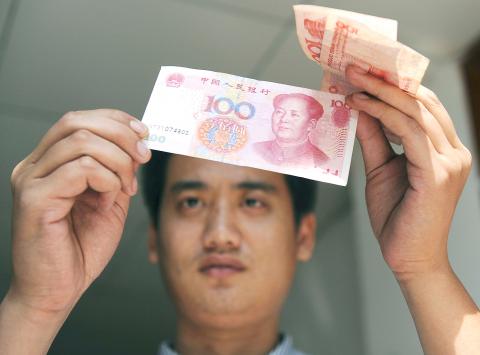|
¡@
China warns US that bill could seriously
affect ties
Reuters, BEIJING
¡@

A worker checks the authenticity of a yuan
note at a restaurant in Hefei, China, yesterday.
PHOTO: REUTERS
¡@
China yesterday warned that a US House of Representatives
bill to penalize it for not letting the yuan rise faster could seriously affect
bilateral ties.
In a relatively measured response, Chinese Foreign Ministry spokeswoman Jiang Yu
(«¸·ì) said Congress should avoid steps that could harm relations, saying Beijing
was ¡§resolutely opposed¡¨ to the bill, but she declined to say whether China
would retaliate.
The US House of Representatives bill, which many analysts say is unlikely to
become law, is aimed at pressuring Beijing to let its currency rise faster by
branding it in violation of world trade rules.
¡§Using the renminbi [yuan] exchange rate issue as an excuse to engage in trade
protectionism against China can only harm China-US trade and economic relations,
and will have a negative effect on both countries¡¦ economies and the world
economy,¡¨ Jiang told a regular press briefing. ¡§We urge the members of the US
Congress to understand clearly the importance of China-US trade and economic
relations, and put a halt to protectionism, so as to avoid hurting the interests
of the peoples of the two countries and of the world.¡¨
Whether China would take any US law on the yuan to the WTO was ¡§hypothetical,¡¨
she said.
The bill would need to be passed by the Senate ¡X far from certain and not likely
until after congressional elections on Nov. 2 when the US political landscape
could be greatly changed ¡X and signed by US President Barack Obama to become
law.
China¡¦s tight leash on the yuan is under intense scrutiny as countries around
the world look to export their way back to economic health, raising concerns
they will intentionally weaken their currencies to gain an edge.
The bill allows the US Commerce Department to treat ¡§fundamentally undervalued
currencies¡¨ as an illegal export subsidy so that US companies can request a
countervailing duty to offset China¡¦s price advantage.
Earlier in the day, Xinhua news agency quoted Chinese Commerce Ministry
spokesman, Yao Jian («À°í), as saying: ¡§Starting a countervailing investigation in
the name of exchange rates does not conform with relevant WTO rules.¡¨
That lawyer-like statement was relatively moderate compared with China¡¦s
reaction to other disputes this year, including US weapons sales to Taiwan, when
Beijing froze military contacts with the US.
The American Chamber of Commerce in China voiced its opposition to the Chinese
currency legislation in an e-mail, saying: ¡§If enacted into law, the chamber
does not believe the bill will be effective in achieving its objectives and
would fail to create significant US job growth.¡¨
China¡¦s central bank fixed the yuan¡¦s daily mid-point versus the US dollar at a
weaker level yesterday.
Despite the weaker mid-point, the yuan has now gained almost 2.2 percent against
the US dollar since Beijing scrapped a 23-month-old peg to the greenback on June
19 and said it would let the currency resume a managed float. Nearly all of the
increase occurred last month.
The bill could fan the flames of a long-running dispute with China over trade
and jobs.
It passed with solid bipartisan support just over a month ahead of mid-term
elections, as voters focus on the still-struggling US economy and persistently
high unemployment.
Chinese analysts were skeptical that the legislation would produce any quick
movement on the yuan.
¡§If you are looking for another one-off revaluation of 3 to 5 percent, or are
expecting a 20 percent rise in the yuan over a year ... forget it,¡¨ said Fu
Bingtao (¥I§LÀÜ), an economist with Agricultural Bank of China.
¡@
|
![]()
![]()